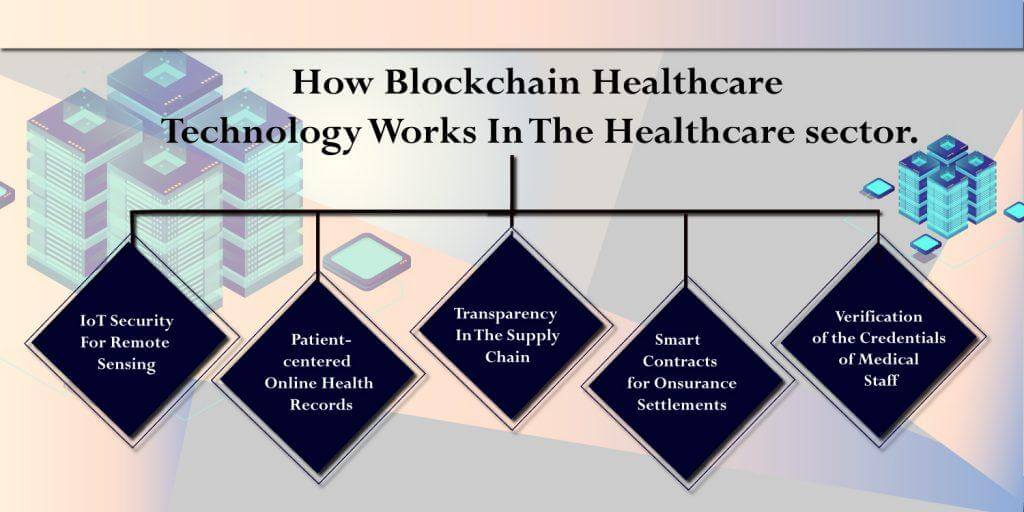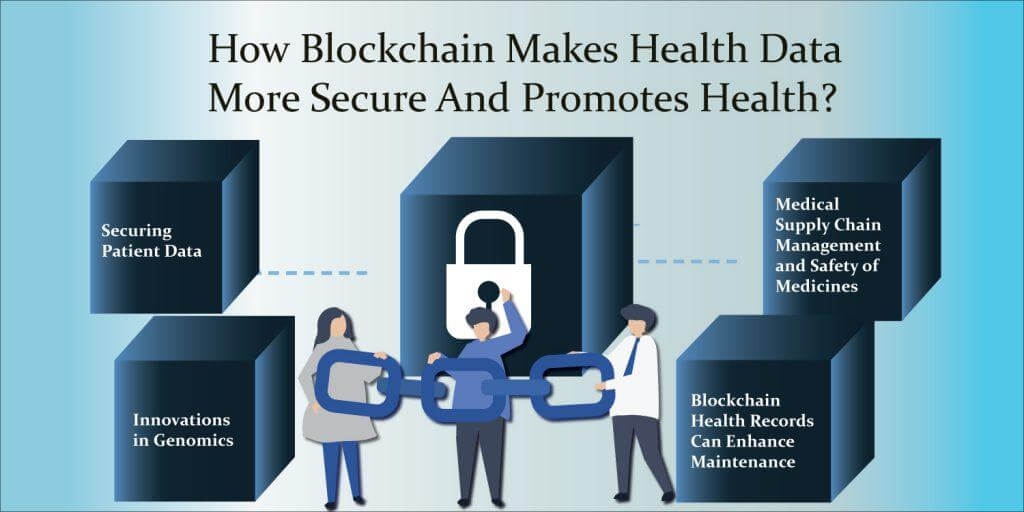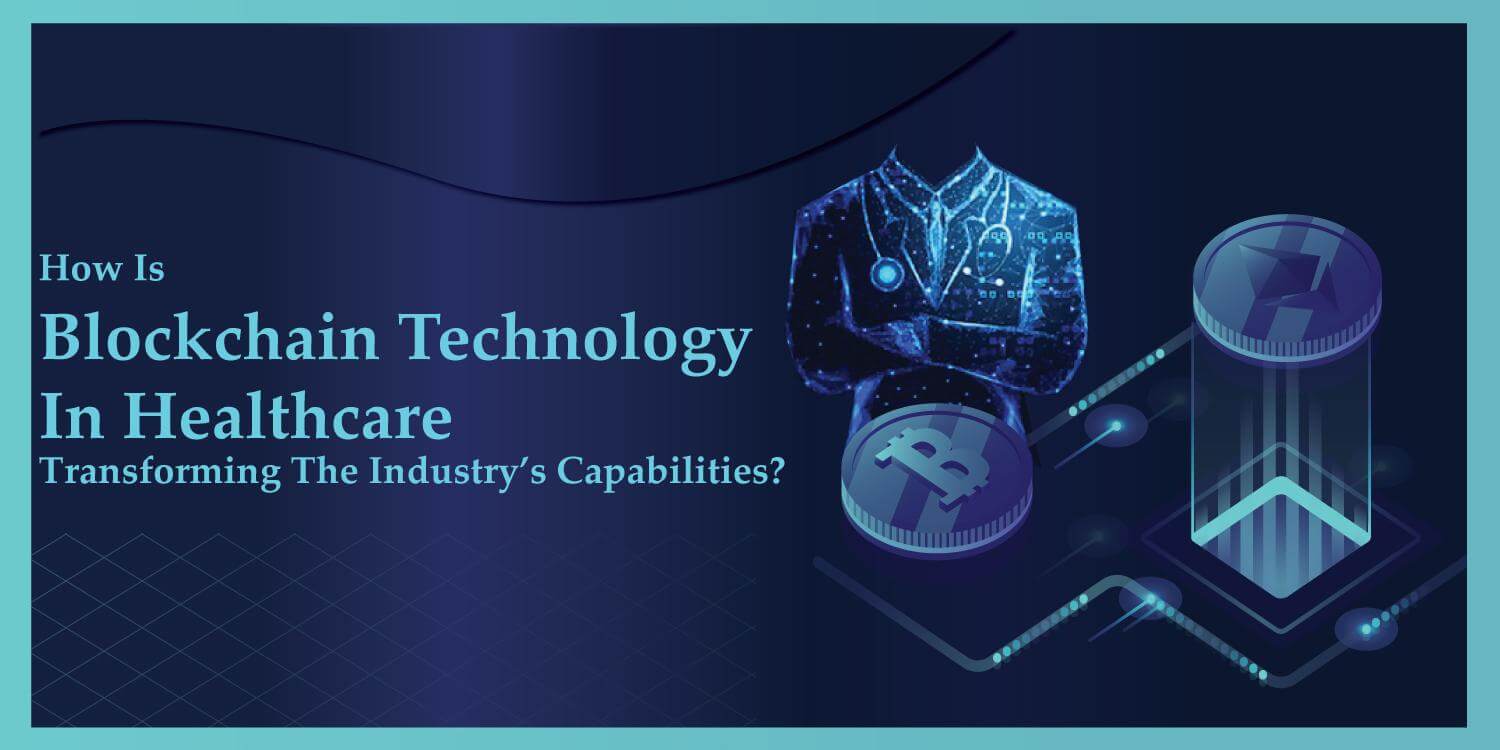How is Blockchain Technology in Healthcare Transforming the Industry’s Capabilities?
Blockchain technology has been immensely popular in the current times. Not only this, but technology has gathered a lot of attention from businesses and investments. But, it has not yet reached its full potential in the blockchain Technology healthcare industry. Blockchain technology is driving demand for revolutionary and evolutionary changes that are yet to take effect in the healthcare sector.
Blockchain and healthcare play a vital role in advancing the healthcare sector. Quality care is an objective of healthcare institutions. With the added benefit of affordable costs, leading to patient-centered service delivery, the future of Blockchain in the healthcare industry is growing.
Implementing Blockchain offers other benefits to the healthcare industry. Healthcare companies can use Blockchain to track and monitor products. Other bits of information involved in the product stream are certain biological substances.
For example, the sensors used in the shipment, which monitor the temperature of the products, transmit the data to Blockchain, which helps to protect against low-quality or counterfeit products. Pharmacy manufacturers have benefited greatly from Blockchain technology in the last couple of years.
Another advantage of Blockchain technology for the healthcare industry is that companies can share information from clinical trials. This system can facilitate the speed of consent tracking and management across multiple sites, protocols, and systems.
What is Blockchain Technology in Healthcare, and How Does it Work?

Blockchain’s most revolutionary offering, presented with a carefully balanced combination of highly advanced cryptography and built-in incentives, is that it eliminates the need for a central control authority and instead divides power among all actors in the blockchain ecosystem. So, in theory, this could eliminate the need for a third party to manage transactions.
The transactions between two entities that do not know or trust each other digitally, securely, and impartially. It works quite well in healthcare, but it has been proven in more traditional business environments. Here is how Blockchain healthcare technology works in the healthcare sector.
1. IoT Security for Remote Sensing
Blockchain cryptography ensures that only authorized parties have access to personal data stored as a unique hash function. For instance, any change to the source data creates a different hash function, and the user must have a specific set of cryptographies—keys for decoding the hash function source data. Once the patient stores the data in the blockchain general ledger, it is almost impossible to corrupt it, as this requires access to all stored copies.
The decentralized nature of the Blockchain means that IoT in the healthcare Industry can communicate directly with each other without having to go through a central server, making it very difficult to launch DDoS and mid-person attacks.
2. Patient-centered Online Health Records
Blockchain opportunities in healthcare have a number of systems in every country and region that are struggling with data warehousing. This means that patients and their healthcare providers lack an overview of their medical history. Access to more reliable and comprehensive population-level data would allow for more efficient segmentation and analysis of targeted medical outcomes.
Along with supply chain solutions, Farma Trust has developed a solution to support gene and cell therapy therapies, while many research programs are also exploring how to combine artificial intelligence in healthcare and Blockchain to promote personalized medicine.
3. Transparency in the Supply Chain
A major challenge for the future of Blockchain in the healthcare sector as a whole. For many others, is to guarantee the origin of medical goods in order to authenticate them. The use of a block-based system to track goods from the point of production and at each stage of the supply chain allows customers to have full visibility and transparency of the goods they purchase.
This is a priority for the industry; especially in emerging markets, where falsified prescription drugs cause tens of thousands of deaths each year. It is also becoming increasingly important for medical devices, which are growing rapidly with the introduction of remote sensing and are therefore attracting the attention of bad people.
4. Smart Contracts for Onsurance Settlements
Companies such as Chronicled and Curium offer blockchain-based systems. Through these systems, different healthcare players, such as pharmaceutical companies, OEMs, wholesalers, insurers, and healthcare providers, can authenticate their identity as an organization, log contract details, and track transactions.
Goods and services and billing details for payments for those goods and services. This type of environment goes beyond supply chain management, allowing healthcare trading partners and insurance providers to operate on the basis of fully digital and, in some cases, automated contract terms.
5. Verification of the Credentials of Medical Staff
The Blockchain in healthcare today is majorly used to track the valid experience of a number of medical professionals and help trusted medical institutions and healthcare organizations to register their staff credentials, helping to streamline the recruitment process for healthcare organizations. ProCredEx, based in the United States, has developed such a medical credential verification system using the R3 Corda blockchain protocol.
How Blockchain Makes Health Data more Secure and Promotes Health?

Using Blockchain technology in healthcare can help relieve pain. It can clear the current wear bubble, protect patient data, and enhance the complete patient experience. Telemedicine solutions in healthcare based on Blockchain are used for everything; from secure encryption of patient data to the control of harmful disease outbreaks. And at least one country, Estonia, is big in terms of the health care potential of the Blockchain. Learn how Blockchain promotes health and safety.
Securing Patient Data
Blockchain healthcare technology maintains decentralized patient data, which makes it a global technology for security applications. In addition, the blockchain technology in healthcare seems transparent, it is also private, hiding each person’s identity with sophisticated and secure codes that can protect the sensitivity of medical data.
Blockchain Health Records can Enhance Maintenance
Misconduct between medical professionals costs the healthcare industry 11 billion USD a year. The time-consuming process of gathering access to a patient’s medical records depletes staff resources and delays the patient’s treatment. Blockchain-based medical records provide a cure for these ailments.
The decentralized nature of Blockchain technology makes a single ecosystem for the patient database. It can also quickly and efficiently be referenced by a number of physicians, hospitals, and others involved in treatment.
Medical Supply Chain Management and Safety of Medicines
The Blockchain impacts the management of the medical supply chain, and it ensures full transparency in the supply chain process. Once the general ledger has been created, it indicates the starting point. The general ledger will then continue to record the data at every step. It includes who processed it and where it was until it reached the consumer. The process can even track labor costs and waste emissions.
Innovations in Genomics
In 2001, it cost 1 billion USD to process a human genome and today it costs about 1K USD. Various top giants of healthcare industry are bringing DNA tests that reveal our health and past to millions of homes. The Blockchain is perfect for this growing industry, as it can securely host billions of genetic data points.
The Bottomline
Blockchain technology in healthcare enables organizations to provide both transparency and privacy. It helps to hide sensitive patient data while allowing access and sharing when needed. Protected by modern security solutions, attackers would need enormous computational power to even try to target a blocked network, severely limiting the frequency, possibility, and effectiveness of attacks.
Blockchain opportunities in the healthcare sector are enabling general-purpose digital technology. It should be assessed on its merits and implemented where it is the best application for the problem, after being compared with alternative solutions—governance and approximation of laws.
Blockchain solutions have certain characteristics that need to be assessed for compliance with laws, regulations, and data management frameworks—incremental integration. The consideration must be in relation to existing systems and technologies. Blockchain technology in healthcare is ready to change the world with its applications in telemedicine. If you have any best telemedicine software needs, VCDoctor has a complete solution for you. Get in touch with our proficient team to know more.




